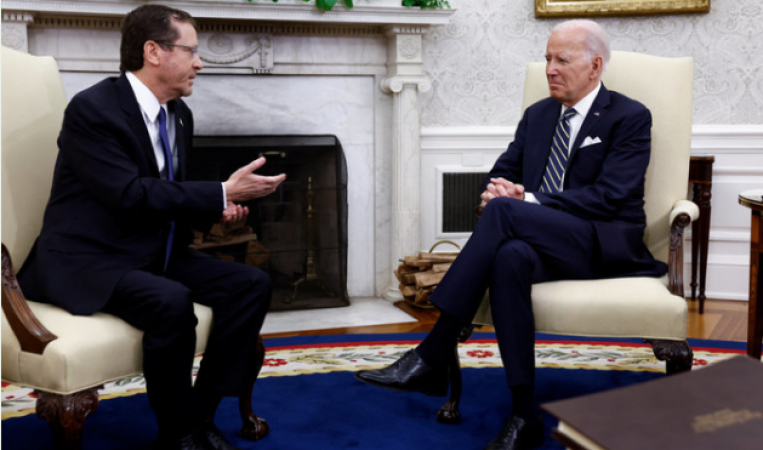
Washington: President Joe Biden received a message from Israel's symbolic leader, Isaac Herzog, assuring him that his country is still committed to democracy in the face of growing US concern over Prime Minister Benjamin Netanyahu's contentious plans to reform the country's judicial system and the ongoing settlement building in the West Bank.
While acknowledging that the nation is going through a tumultuous time, Herzog told Biden while they were sitting side by side in the Oval Office on Tuesday that Israel's democracy is still "sound, strong," and "resilient."
Herzog's visit comes a day after Biden called Netanyahu and extended an invitation for a meeting in the US this fall, though the president voiced concerns about a number of the policies of the Netanyahu hard-right coalition. Despite widespread opposition in Israel, Netanyahu's government is moving forward with judicial reforms, and he has also given the go-ahead for the development of thousands of new homes in the West Bank.
Also Read: Four T-6C training aircraft are delivered by the US to Tunisia
"We are experiencing pain. We are having contentious discussions," Herzog said. "We have faced difficult circumstances. But I genuinely, firmly believe that we should always seek to reach an amicable consensus, and I agree with you on that, Mr. President, as I have said to the people of Israel in my capacity as head of state.
The plan, according to Netanyahu and his allies, a group of ultra-Orthodox and ultranationalist parties, is necessary to limit the authority of unelected judges. The plan's detractors claim that it will undermine Israel's precarious system of checks and balances and push the nation closer to authoritarian rule.
Herzog has pleaded for a solution that has been difficult to come by so far. Democratic lawmakers and numerous American Jewish organizations have voiced their concerns about the plan.
Also Read: Israel's Latest Airstrikes on Syria Wound Two Soldiers
In his brief remarks to reporters, Biden tried to emphasize the significance of the US-Israeli relationship despite the differences that were obvious.
Biden declared, "This is a friendship I believe is just simply unbreakable." "America's commitment to Israel is firm and ironclad, as I reaffirmed to Prime Minister Benjamin Netanyahu yesterday,"
Herzog will visit the US and meet with congressional leaders as well as Vice President Kamala Harris. After his father Chaim Herzog, he will address Congress on Wednesday, making him the second Israeli president to do so. He will deliver a speech to commemorate Israel's 75th anniversary of independence.
Following a two-day air and ground offensive in Jenin, a militant stronghold in the occupied West Bank, Herzog's visit comes just a few weeks after Israeli forces conducted one of their most intensive operations in the West Bank in the past 20 years. In response to a more than 12-month wave of violence with the Palestinians, senior members of Netanyahu's government have been pushing for increased construction and other measures to firmly establish Israel's control over the West Bank.
Officials from the US have generally backed Israel's right to defend itself against militant attacks, but they have also urged restraint to minimize harm to civilians and lobbied against new settlements that would further reduce the likelihood of achieving a two-state solution between Israel and the Palestinians.
The Biden administration chose not to confirm whether Biden would meet with Netanyahu in New York or at the White House, as the Israeli prime minister had hoped to do during the UN General Assembly.
White House visits are typically customary for Israeli prime ministers, so Netanyahu's delay in receiving one has raised concerns in Israel, with detractors pointing to it as evidence of deteriorating ties with the US.
The conversation between Biden and Netanyahu, according to Herzog, sent a crucial message to the area.
Because some of our enemies occasionally mistake the possibility of some differences as having an impact on our unbreakable bond, Herzog said, "I was pleased to hear about your conversation with Prime Minister Netanyahu in which you focused on our ironclad military and security cooperation."
As he did when they last spoke earlier this year, Biden expressed concern to Netanyahu over the judicial plan again on Monday, according to National Security Council spokesman John Kirby, and he urged the "broadest possible consensus" over the legislation that has been pushed by Netanyahu and his hard-line coalition.
The two leaders spoke on the phone about regional security issues and Iran's nuclear program, according to Kirby. Additionally, Biden "expressed concern" over Israel's ongoing West Bank settlement expansion and urged Israel to take action to maintain the viability of a two-state solution with the Palestinians.
According to Kirby, Biden also applauded the Palestinian Authority's efforts to reassert security control over Jenin and other West Bank areas, as well as Israeli and Palestinian efforts to advance toward another round of direct negotiations.
Reps. Jamaal Bowman, Cori Bush, Ilhan Omar, and other progressive lawmakers have vowed to abstain from Herzog's speech in opposition to Israel's policies.
Rep. Pramila Jayapal, chair of the influential 100-member Congressional Progressive Caucus, sparked outrage by calling Israel a "racist state," prompting criticism from Rep. Hakeem Jeffries, the leader of the House Democratic Caucus, and Herzog's visit comes just days later. Later, Jayapal clarified that she was criticizing Israel's government, not the country itself.
Kirby claimed that Biden appreciated her apology. He told reporters on Monday, "We think an apology was the right thing to do."
Also Read: UN: The world needs to get ready for more severe heatwaves
In the 1967 Middle East conflict, Israel seized control of the West Bank, east Jerusalem, and the Gaza Strip. All three territories are under Palestinian claim for a future independent state.
Internationally unrecognized, Israel has annexed east Jerusalem and claims it is a part of its capital. It asserts that Israel withdrew from Gaza in 2005, whereas the fate of the West Bank should be decided through negotiations. The militant Hamas organization seized control of the region two years later.